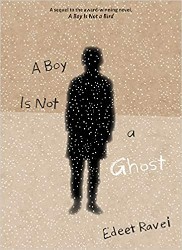Children experience war directly, but they also try to process its irrational cruelties through the filter of adult rationalizations. Sometimes, those rationalizations are calculating lies, but other times they are meant to protect the vulnerable. Edeet Ravel’s exceptional novel tells the story of one Jewish child, Natt Silver, who is caught up in the chaos of World War II-era Romania and its successive occupation by the Soviets and the Nazis. Ravel’s deep respect for children is evident on every page of this haunting story, as she allows Natt to express all the ambivalence and confusion which take over his life during this terrifying time. The book’s title is not magical or mythic. It refers to Natt’s skepticism when his loving father tries to convince him that, after the war, just as birds return to their flock, everything will return to normal. Throughout the book, Natt is forced to compare the interpretations of adults to his own encounters with reality. The result is a compelling story which chooses difficult and ambiguous truths over comforting simplification.
In 1940, Natt’s homeland is a polyglot mix of cultures. The coexistence of ethnic groups, although with some tensions, had been a feature of Romanian society but then became a symptom of danger. When the Soviet Union occupies the country, as a result of the Hitler-Stalin pact, Russian becomes one more element of Natt’s universe. He and his best friend Max had styled themselves “Musketeers,” transforming daily events into imaginary adventures based on the books which they loved. But soon, negotiating their way among daily contradictions becomes a matter of survival. When Natt’s father is arrested as an “enemy of the people,” all the choices that he and his mother make assume existential proportions. Although the father, whom he adores, had reassured Natt that war gives each person “the chance to be a hero,” the boy learns that luck governs everything, in contradiction to all his parents had taught him.
Natt’s first-person narration of events and his reactions to them are convincing, and the author’s use of repeated motifs and dramatic pacing are crucial. Tolstoy’s War and Peace, the Russian classic which chronicles the interactions between characters and overwhelming world events, is central to Natt’s imagination. His new teacher, a Russian Jew, is reading aloud from the novel to Natt’s class when their playground is surrounded by Soviet soldiers: “Suddenly, it’s as if we’re in the story. Right inside War and Peace.” Later, as the residents of his town are deported to Siberia and the Nazi invasion is imminent, his teacher reappears with a gift for him of Tolstoy’s novel. When Natt approaches a Russian guard for a drink of water in their temporary internment center, he finds a moment of humanity when the soldier shares his love of Tolstoy with his young prisoner.
Random connections have replaced the reliability of facts in Natt’s life. His mother’s insistence on finding redeeming value in the slightest mitigating circumstance is both frustrating and comforting to him; eventually he has a nightmare in which he confronts her about her well-intentioned, but irrational optimism: “We’re not lucky! We had a house, we had horses, we had a warehouse with chutes…Now I’m hungry and dirty and crawling with bugs and the train smells like a sewer.” War has exaggerated all of the paradoxes of a childhood in which the normal needs for both safety and autonomy have become threatened. Ravel fluently weaves these universal truths into a novel embedded in history, offering young readers an opportunity to experience both aspects of Natt’s life.
This highly recommended book includes an “Author’s Note” explaining that the story is based on a real person from the author’s past as well as a section with additional historical information.
Emily Schneider writes about literature, feminism, and culture for Tablet, The Forward, The Horn Book, and other publications, and writes about children’s books on her blog. She has a Ph.D. in Romance Languages and Literatures.



